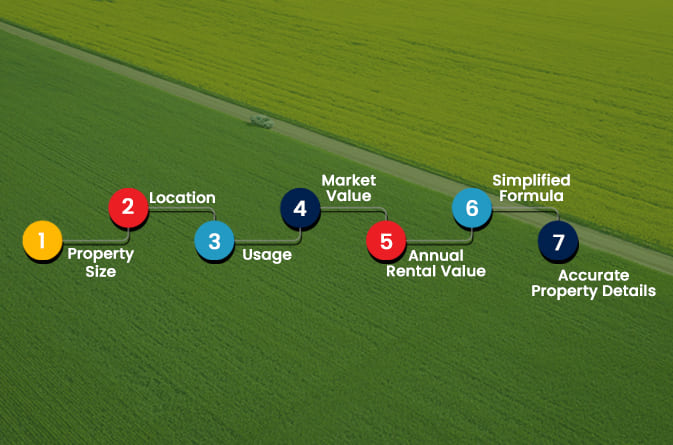Understanding the complexity of property tax is crucial for anyone owning property in Bangalore, especially for non-residents. Whatever may be if you are an investor or a foreigner who has purchased property in the city, it is essential to stay informed about the local tax system. Property tax is a significant aspect of property ownership in Bangalore, and as a non-resident, you may have to follow different guidelines than residents when it comes to paying taxes and managing your property.
In this blog, we’ll discuss everything non-residents need to know about property tax for non-residents in Bangalore. From how the tax is calculated to payment processes and challenges, we will provide insights into the Bangalore property tax system. Additionally, we will address some special considerations for non-residents and offer useful tips on managing your property tax payments effectively.

Overview of Property Tax in Bangalore
Property tax for non-residents in Bangalore is levied by the Bruhat Bengaluru Mahanagara Palike (BBMP), the civic body responsible for the city’s infrastructure and services. The tax is calculated based on the Annual Rental Value (ARV), which is the yearly rent that could be earned if the property were rented out. The tax is applicable to both residential and commercial properties, and the amount varies depending on factors such as the location, area, and usage of the property.
For Bangalore property tax for NRIs, the guidelines and rates are the same as those for residents, but non-residents should be mindful of specific compliance requirements. For instance, NRIs may need to appoint an agent or a property manager in Bangalore to handle tax payments and other property-related matters in their absence.

Property Tax Calculation Process
The calculation of property tax in Bangalore involves several key factors. Here’s a breakdown of how property tax is calculated:
- Property Size: Larger properties generally incur higher taxes.
- Location: The location of the property (such as proximity to commercial areas or main roads) significantly impacts the tax rate.
- Usage: Whether the property is residential, commercial, or vacant land affects the calculation.
- Market Value: The market value of the property plays a crucial role in determining the tax.
- Annual Rental Value (ARV): In some cases, ARV is used as the basis for calculating the property tax.
- Simplified Formula: A simplified formula is applied, often using ARV as the primary basis to calculate the tax amount.
- Accurate Property Details: Non-residents should ensure they have accurate property details to avoid discrepancies in tax calculations.

How to Pay Property Tax in Bangalore for NRIs: Step-by-Step Process?
Paying property tax in Bangalore as an NRI has been simplified through online portals.
Here’s a nine step-by-step guide to help you navigate the process:
- Go to the official BBMP website for property tax payments. The website provides an easy-to-use interface for property tax transactions.
- If you haven’t already registered, create an account with your property details. If you’re a returning user, simply log in using your credentials.
- Enter your property’s details, such as the Property Identification Number (PID), the type of property (residential/commercial), and the location to fetch accurate tax information.
- The system will automatically calculate your property tax based on your property’s size, location, and usage. Double-check the tax amount to ensure it’s accurate.
- Choose your preferred payment method, such as net banking, credit/debit card, or payment through a third-party payment gateway.
- Proceed with the payment using the selected payment method. Ensure the payment is made in full and before the due date to avoid penalties.
- Once the payment is successful, you will receive a payment receipt. Download and save it for your records.
- To avoid missing future payments, set up reminders on the portal or opt for an auto-pay feature. This ensures timely payments in subsequent years.
- Alternatively, if managing payments remotely is difficult, you can appoint a property manager or tax consultant to handle your property tax payments on your behalf.
Special Considerations for Non-Residents
One key challenge non-residents may face is the physical distance from their property in Bangalore. Managing tax payments, especially when overseas, can be complicated. This is where property managers or trusted agents come into play. A property manager can handle all aspects of the property, including ensuring that property tax payments are made on time.
Non-resident tax rules in Bangalore may also differ slightly for different property types. For example, agricultural land and vacant plots might have different tax rates or exemptions. Non-residents should be aware of these nuances to ensure they aren’t overpaying or missing out on eligible exemptions.

Final Words
Property tax for non-residents in Bangalore is an essential aspect of owning property in the city, and non-residents must ensure timely payments to avoid penalties. By understanding the Bangalore property tax guidelines for foreign investors, the calculation process, and how to pay property taxes online, non-residents can manage their property tax obligations effectively. It’s advisable to appoint a local property manager or agent to streamline this process and stay compliant with all tax rules.
If you’re looking for a promising real estate investment, Bright Projects offers you the best villa plots just 300 meters from the Satellite Town Ring Road (STRR). Hurry and secure your plot now for a bright future ahead!


